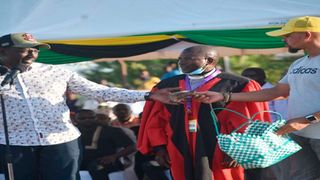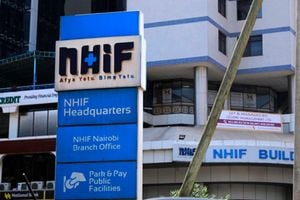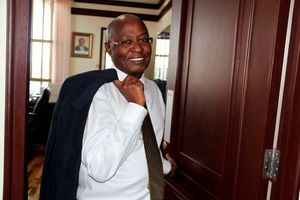
Deputy President William Ruto with Lunga Lunga MP Khatib Mwashetani at Mwereni area in Mwangulu, Lunga Lunga Sub-county in Kwale County for the official opening of the police station and chief's office on February 4, 2021.
| File | Nation Media GroupNews
Premium
No more harambees for 2022 elections aspirants
Political aspirants will from today not be allowed to participate in harambees for the benefit of others, thus ending a campaign issue that has fuelled conflict between Deputy President William Ruto and opposition chiefs led by Mr Raila Odinga.
The DP has regularly held fund-raisers for churches, women and youth groups, giving generous donations as his opponents in the presidential race questioned the source of the cash.
But such harambees are now outlawed as the provision of the Elections Act that bans fund-raisers within eight months of an election come into force.
The Independent Electoral and Boundaries Commission (IEBC), which set December 9 as the date to end fundraising by aspirants, has warned anyone who violates the law risks disqualification from next year’s elections.
An attempt to level the playing field by discouraging the influence of money in elections informed the law designed to ensure aspirants with deep pockets do not buy voters.
“The import is to curb aspirants from influencing voters by donating funds/monies for support,” IEBC chairman Wafula Chebukati told the Senate last week.
While questions have been raised about IEBC’s ability to enforce electoral laws, rival aspirants can petition the commission if they collected evidence of the electoral offence.
Aspirants, however, are allowed to raise as much money as they can for their own campaigns following the revocation of rules that would have restricted campaign fundraising and spending.
In the regulations MPs rejected, expenditure by presidential candidates in campaigns was to be capped at Sh4.4 billion, with political parties allowed to spend up to Sh17 billion, revealing just how much money is expended in politics.
Guts to remain afloat
On Wednesday, Mt Kenya tycoons under the Mount Kenya Foundation threw their weight behind Mr Odinga’s presidential bid, which could give him a major financial boost.
Nyeri Town MP Ngunjiri Wambugu says that even though it requires intelligence, principle and guts to remain afloat in politics, money plays a key role in influencing voters.
“It’s very hard to do politics in Kenya without wealth; mainly because money has become a shortcut to influencing people,” the MP told the Nation.
His Mathira counterpart, Rigathi Gachagua, said tycoons often spend on more than one aspirant to cover their bases in a presidential election.
“These people (tycoons) invest in everybody... to increase their chances of being in government,” claimed Mr Gachagua, who refused to say whether that was true of the Ruto camp.
But according to Ndaragwa MP Jeremiah Kioni, the era of money in Kenyan politics will come to an end if Mr Odinga is elected President next year. He argued the ODM boss has never cultivated the culture of handouts.
“This habit of giving handouts is only found in UDA (United Democratic Alliance party, which is associated with the DP),” Mr Kioni claimed.
Political commentator Prof Ken Oluoch, who heads the Political Science department at Moi University noted: “In advanced democracies, it is the manifestos that matter more. However, in emerging democracies, politics is usually expensive in monetary terms. This is partly due to our political culture and partly due to the economic status of the populace,” the don explained.
“The place of money in Kenyan politics is so much hoisted, to hide the deficit of ideas by most politicians,” argued political commentator Javas Bigambo.
So serious is the place of money in Kenya’s polls that Mr Odinga, ANC’s Musalia Mudavadi and Wipe’s Kalonzo Musyoka were recently separately forced by Trans Nzoia residents to give money before they could speak.
Police also recently blamed distribution of cash for chaos in DP Ruto’s rallies in Kisumu.





